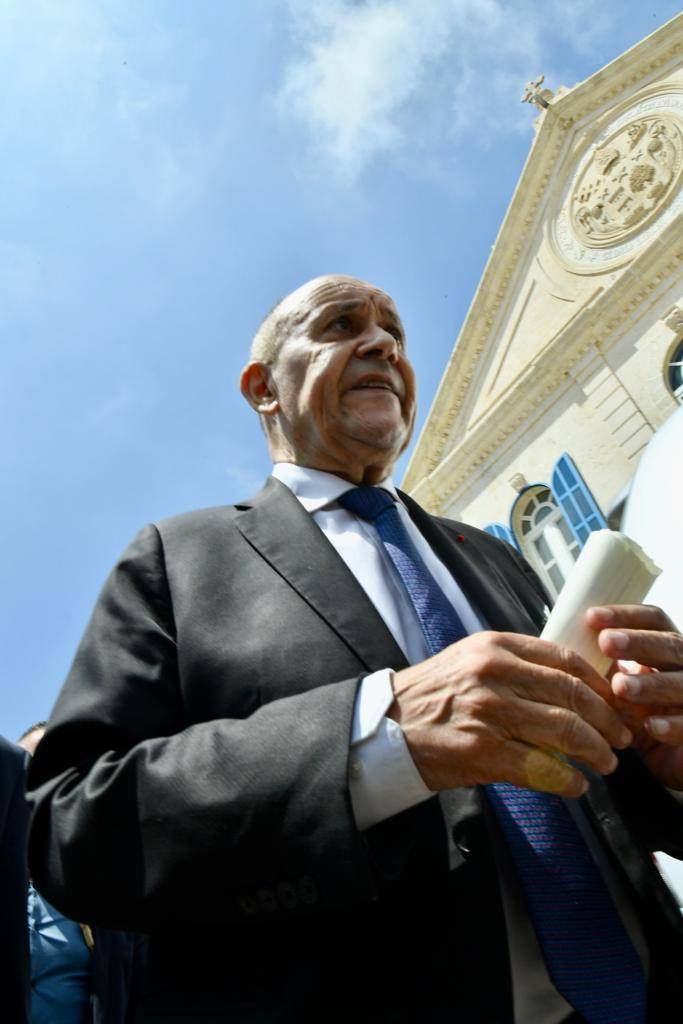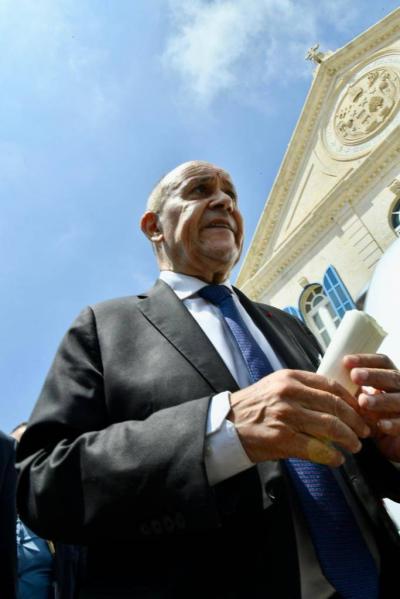A flood of analyses and interpretations preceded the visit of French presidential envoy Jean-Yves Le Drian to Beirut. However, his tour yesterday of several political and spiritual leaders, along with his multiple meetings, clarified that his first visit to Lebanon aims to "assess the situation in an effort to help find solutions for the crisis Lebanon is going through and to discuss with various parties how to achieve the desired solution." He emphasized that he does not carry any initiative, that he will engage in dialogue with everyone, and that he will conduct exploratory visits to assist Lebanon in overcoming its crisis, based on the wishes of French President Emmanuel Macron.
Le Drian heard much from the different parties he met and posed more questions. A parliamentary source present at one of the sessions mentioned to "Wardna" that he was listening, attentive, and taking notes, but he was also engaging in discussions. Ironically, the seasoned diplomat, who has the influence to deal with those capable of solving problems and possesses extensive experience in crisis management, and who is highly informed about the Lebanese files and issues, was the first to warn the Lebanese officials about the seriousness of the situation and the "uncertain future," comparing Lebanon's political and economic collapse to "the sinking of the Titanic, but without music." He returns today to listen to them themselves, hoping to achieve a miracle that would take them out of the circle of horizontal and vertical divisions.
Thus, in light of the existing status quo, the adherence of parties to their positions, and their entrenched interests, the basic question that many ponder is: what new insights did Le Drian gain from the officials during his exploratory tour, and what can he offer that is new, especially since France is very familiar with the intricate details of Lebanese politics and has been trying since the vacancy began to find a solution, proposing an initiative that did not succeed? This question was answered by one of the deputies who knows Le Drian well, stating that the new French envoy has special qualities and a history that supports him in undertaking difficult tasks. Although France knows the Lebanese details, there is significant reliance on the personality tasked with this mission, and it is important to note the recent Christian rapprochement, particularly regarding the presidential file, and what emerged from the June 14 session of Christian alignment, which must be considered, despite the President being the President of the Republic of Lebanon and his allocation being reserved for Christians.
Isn't it disgraceful to await mediation from here and a quintet meeting from there to elect the President of Lebanon? In any case, Le Drian focused during his exploratory tour on several questions centered around: What is the exit for electing the President of the Republic? What are the key tasks assigned to the next president, regardless of the broad headings agreed upon? Who is the person capable of carrying out these tasks, considering both local and regional realities? Who is the figure that could form common ground among the Lebanese to break the current deadlock? If the president is elected, will a dispute arise regarding the Prime Minister? How do the political forces view the composition of the government?
After hearing the answers, the French envoy will sift through the ideas to study them not only with President Emmanuel Macron but also with the "quintet + Iran," which is a fundamental lever for his mission. According to information obtained by "Wardna," Le Drian proposes specifications away from names, based on the principle of no victor, no vanquished; i.e., a President from one team and a Prime Minister from another team. If the political forces agree on the specifications, discussions begin regarding names that should receive mutual consent around the President of the Republic and the Prime Minister and regarding the government. Thus, the envoy is working on this threefold structure, attempting to create a roadmap or vision for resolving the crisis through reaching commonalities among the parties, hoping they will crystallize later. Accordingly, France, along with various decision-making capitals, has become convinced of the impossibility of achieving the presidential requirement based on an initiative previously proposed by Paris, especially after Christian consensus rejected the "Marda Movement" leader Sleiman Frangieh.
It is not unlikely to create conditions for a national dialogue that leads to a package of agreements, resulting in a consensual presidential option, outside the current alignments, a Prime Minister, and the formation of a government that must be quickly established. All of this remains within the realm of speculation, relying on Le Drian's ability to communicate with the countries involved in the Lebanese file, persuading them to ease his tasks, and succeeding in pulling the Lebanese from the quagmire of their disputes amid conflicting data regarding Saudi Arabia's position on the presidential file. Some say it still holds its position and will not interfere in the Lebanese matter. A knowledgeable source noted in conversation with "Wardna" that President Emmanuel Macron asked Saudi Crown Prince Mohammed bin Salman to intervene with Tehran to facilitate the presidential requirement in Lebanon and to translate the Saudi-Iranian agreement into the Lebanese reality, but the Crown Prince merely replied: "We will coordinate with you." Meanwhile, some reports talk about serious and ongoing coordination between Riyadh and Paris on one hand, and between Riyadh and Tehran on the other, to reach a convergence around the identity of the prospective president, starting from the outcomes of the June 14 session.
In this context, one former Foreign Minister confirmed to our site that Lebanon is not a priority for the involved countries and is not a main item on the negotiation tables, and we are waiting for a great settlement. When an Iranian-American consensus is reached in the nuclear file, the tone within will change for all parties because historical experience has taught us that the president is appointed from abroad. Unfortunately, "we are a country without sovereignty, and we cannot elect a president." France may act as a mediator, but it cannot solve the Lebanese crisis alone; there are three powers that hold the solution: Saudi Arabia, Iran, and America. While countries operate for their interests, we do everything that contradicts our interests. Meanwhile, a member of the opposition asked, "Isn't it embarrassing to wait for mediation from here and a five-party meeting from there to elect the President of Lebanon? Why do we wait for abroad to make the decision for us? We should not always rely on external parties that have their own interests, nor should we succumb to the interests of countries. The fundamental dilemma lies within, and we must transition to a state that aligns with the developments taking place in the region and the wider area where the main focus is stability."
All current indicators suggest that the presidential horizon remains cloudy and bleak, and initiatives, mediations, or efforts have not reached a minimum level of maturity. Thus, Le Drian's tour has dispelled doubts, making it exploratory, with plans for him to return to Lebanon later. An insider confirmed to "Wardna" that the next visit depends on the outcomes that the French envoy can reach through the insights and findings from his initial meetings. The closer the second visit is, the more it indicates positivity and the possibility of resolution; conversely, if the upcoming visit is delayed, it signals that French mediation faces significant complications. Therefore, it is impossible to determine a date for the second visit despite discussions about it taking place next July because the French envoy's mission is complex and tied to how responsive the involved countries are to him as well as the Lebanon parties' willingness to compromise.
Hence, it must be emphasized that the French envoy does not hold a magic wand, as long as the Lebanese alignment has not changed, and the resulting obstacles have not been untangled, with positions remaining rigid, while most domestic factions are convinced that the solution and linking matters are in the hands of the Lebanese themselves. If they possess the desire and will to facilitate and extract the country from its impasse, they can elect a president without any international mediation. However, if they cling to their obstinacy and selfishness, and remain entrenched in their interests, no state or mediation, however elevated, will succeed in putting the country back on the right path. This is what the French mediator emphasized when he stated from Bkerke: "I do not carry any proposal, but I will listen to everyone, and the solution primarily comes from the Lebanese."
Based on this reality, after waiting eight months to fill the vacancy, all current indicators suggest that the presidential horizon remains cloudy and bleak, and initiatives, mediations, or efforts have not reached a minimum level of maturity. It is not unlikely that the presidential requirement could be postponed until after the summer season or even until the end of this current year unless there are new developments in the internal situation. As long as everyone agrees on the impossibility of electing a president after repeating the futile scenario for 12 electoral sessions, the Lebanese are waiting for external initiatives to pull them out of their quagmire based on the notion that a drowning person clings to a straw for survival. Will Le Drian succeed in saving them?




